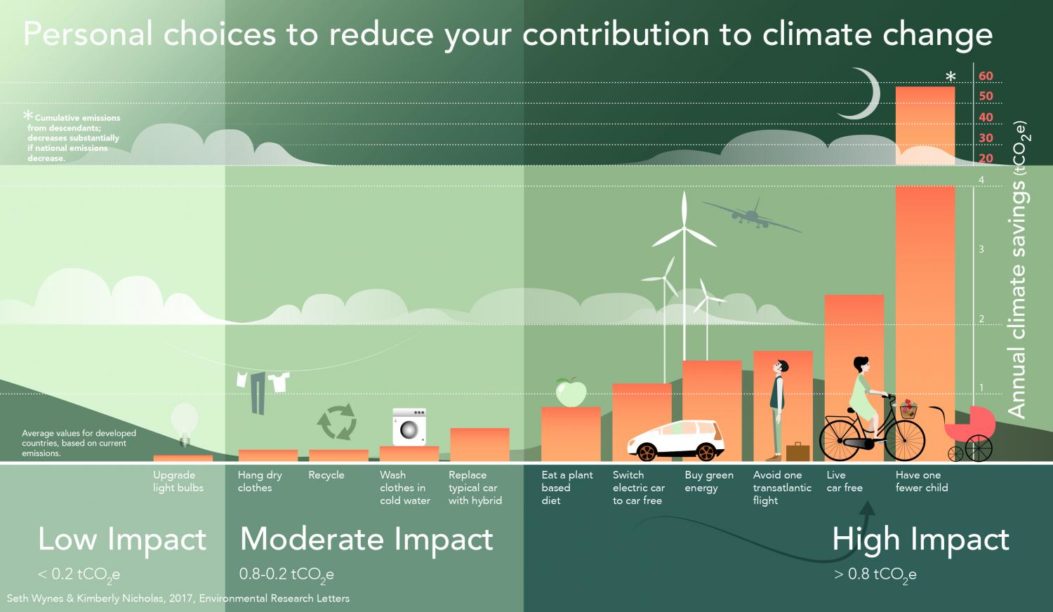For a decade or more there has been a cottage industry in telling people that individual action is meaningless in the face of the overwhelming force of climate change. Plane rides don’t matter, eating meat doesn’t matter; 100 companies are causing 71% of the emissions and it is they who are the problem; only governments acting in concert have the remotest chance of arresting the disaster. And so on.
One of the most influential of these arguments, with 328,677 shares at the time of writing, is a much-quoted 2017 Guardian piece by Martin Lukacs, who wrote, “Stop obsessing with how personally green you live–and start collectively taking on corporate power.”
“While we busy ourselves greening our personal lives,” he added, “fossil fuel corporations are rendering these efforts irrelevant. The breakdown of carbon emissions since 1988? A hundred companies alone are responsible for an astonishing 71%. You tinker with those pens or that panel; they go on torching the planet.”
While I sympathize with Lukacs’s desire to rein in the energy oligarchs, he and other anti-individualists, like Eric Levitz in last week’s Intelligencer, are dead wrong that individual action doesn’t count.
The 71% of emissions that 100 companies are responsible for are producing?? They are mainly the result of extracting and refining fossil fuels that individuals are using for flying and driving and importing bottled water from glaciers and plastic bird feeders from China. Economic questions of supply and demand are far more salient to the matter of emissions than is any aspect of political will.
Human activity is interconnected. When the breakneck demand for these things ends–as indeed it must and will, either in time, or too late–there will no longer be a market for what the energy oligarchs are selling. From a purely logical economic perspective, it’s the only real way to stop them.
Let’s have a look at this remark of Lukacs’s again.
“Collectively taking on corporate power” is just exactly what will happen when millions of individuals stop flying on airplanes, which, again, is a thing that has to happen in order for the planet to survive. Whether through a global individual cap and trade program or simply because individual people collectively realize, together, that they are dooming the Earth and had better drive to their next holiday, is entirely immaterial. Though even a casual witness to the abject stupidity of the world’s politicians must surely suspect that the latter course has better chances.
In any case, the bigger problem with the anti-individualist stance to taking collective action is an even simpler one. There is no way to achieve collective action without individual action. Collective action doesn’t fall off a tree, it is made up of countless individual acts that turn into conversations, writings, meetings, plans. Individual actions are the only material from which collective action can be made, and to suggest that individuals are helpless and somehow just don’t matter now, in the current emergency, at a time of rising confusion, anger, hopelessness and dread, is nothing short of enraging.

The most effective individual steps to tackle climate change
In the Intelligencer, Levitz writes: “With climate change, the pointlessness of individual action is especially acute. If you accept the scientific consensus on warming, then you know your personal carbon footprint is a drop in the rising sea. So, why on earth would you feel compelled to lower your quality of life for the sake of cutting carbon emissions by a wholly negligible amount?”
What even?
Why would you even consider dialing back your own special role in destroying the planet? Why not go vacation in Tulum, while you’re at it, why not go befoul The Beach, you saw it in a movie?
It is high time for an end to the nihilist bullshit that is telling the public it doesn’t matter whether or not they eat meat or fly in airplanes. It does. Not least because even a small chance to contribute to a better possible future gives life and work meaning and value—conceivably, maybe, even more value than just obediently swallowing down your consumerist “quality of life,” spoon-fed to you by the loving algorithms of the surveillance state.
A less lemming-like, suicidal, self-loathing, murderous society would just plain say the obvious: every decision matters, in a time of crisis. Individual, collective, political, business: human life is a single gigantic machine of endless complexity, working every second on innumerable levels, and every iota of the machine involves a responsibility to society and to the future.
So if the planet is to survive the effects of human stupidity and shortsightedness—which question, admittedly, does incline the rational mind to pessimism, but still—and if every single decision counts: Why not take the Pascal’s Wager position? Why not act as if success, as if a good surprise, were possible?
In the Oxford philosophical journal The Monist of July 2011 (Vol. 94, No. 3, “Morality and Climate Change”) Avram Hiller’s (really excellent) article “Climate Change and Individual Responsibility” [JSTOR] applied a philosophical and moral lens to these questions. Hiller gives five conjectures “as to why people erroneously do not believe that individual actions have much or any effects” on climate change. They include the “Nero’s Fiddle” effect, which is like “it’s too late, fuck it, it doesn’t matter what I do”; psychic numbing, or failing to reason properly because too freaked out; limited capacity for valuing, or, “I’m too small to matter at all,” and fallacy of double-division, which is kind of like, “I can get away with putting just one straw on the camel’s back; if anything goes wrong it’s not because of me.” But really the first conjecture he gives is the best one.
Selfishness and denial. “In fact, we do in some way understand that individual actions are significant, but are also aware that if we countenance this fact and wish to remain moral, our whole lives must change. So we subconsciously let ourselves believe that small individual actions in fact make no significant difference.”






